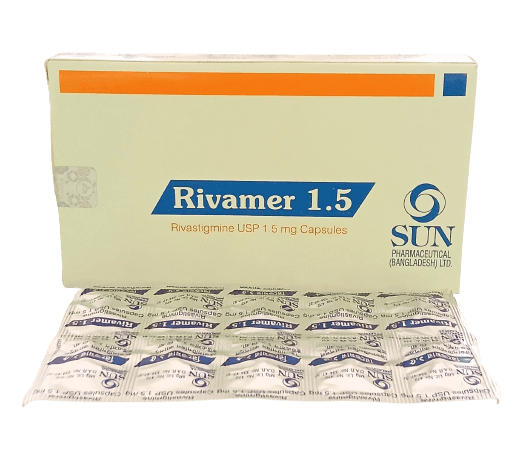
Type:10 Capsules
Generic Name:Rivastigmine
Manufacturer:Sun Pharmaceutical (Bangladesh) Ltd.
Price:৳230.00
Severe dementia in Alzheimer's disease, Parkinson Dementia
Should be taken with food.
Alzheimer Dementia Oral Indicated for mild-to-moderate dementia of the Alzheimer's type Initial: 1.5 mg PO q12hr Increase by 1.5 mg/dose q2Weeks; not to exceed 6 mg PO q12hr Maintenance: 3-6 mg PO q12hr (higher end may be more beneficial) Transdermal Indicated for mild, moderate, and severe dementia of the Alzheimer's type Initial: Apply 4.6 mg q24hr Dose titration: May increase dose to 9.5 mg q24hr after a minimum 4 weeks if well tolerated; after an additional 4 weeks, may further increase to 13.3 mg patch if needed Mild-to-moderate Alzheimer disease: Effective dosage range is 9.5-13.3 mg/24 hr Moderate-to-severe Alzheimer disease: Effective dose is 13.3 mg/24 hr Replace with new patch q24hr Parkinson Dementia Oral Initial: 1.5 mg PO q12hr Increase by 1.5 mg/dose q4Weeks; not to exceed 6 mg PO q12hr Maintenance: 1.5-6 mg PO q12hr Transdermal Initial: Apply 4.6 mg q24hr May increase dose to 9.5 mg q24hr after a minimum 4 weeks if well tolerated; after an additional 4 weeks, may further increase to 13.3 mg patch if needed Transdermal Mild-to-moderate hepatic impairment: Not to exceed 4.6 mg q24hr
Transdermal Renal impairment: No dosage adjustment required
Hypersensitivity to other carbamate derivatives. Severe hepatic impairment.
Rivastigmine reversibly inhibits hydrolysis of acetylcholine by cholinesterases thus increasing acetylcholine present in the CNS. It is selective for the CNS and is used for the symptomatic treatment of dementia in Alzheimer's disease and idiopathic Parkinson's disease.
Patients with sick sinus syndrome or conduction defects, resp diseases. Cholinergic stimulation may increase gastric acid secretion. May exacerbate urinary obstruction and seizures. Pregnancy. Renal impairment, mild to moderate hepatic impairment. Monitor body wt. Asthma or obstructive pulmonary disease. May worsen extrapyramidal symptoms. Lactation. Lactation: Unknown if excreted in milk; not recommended
>10% Nausea (PO 47%; patch 21%),Vomiting (PO 31%; patch 6-19%),Dizziness (PO 21%; patch 2-7%),Diarrhea (PO 19%; patch 6-10%),Headache (PO 17%; patch 3-4%),Anorexia (PO 17%; patch 3-9%),Abdominal pain (PO 13%; patch 2-4%) 1-10% Decreased weight (3-8%),Insomnia (PO 9%; patch 1-4%),Anxiety (PO 5%; patch 3%),Asthenia (PO 6%; patch 2-3%),Vertigo (2%),Fatigue (2%) Potentially Fatal: Serious GI reactions such as anorexia, vomiting and weight loss.
Not to be used with other cholinomimetic drugs that might interfere with the activity of anticholinergic medications. May exaggerate the effects of succinylcholine-type muscle relaxants during anaesthesia. Tobacco smoking may increase its clearance.